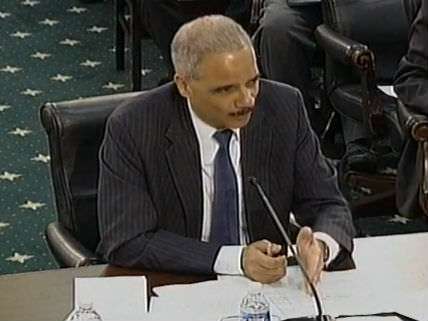When Holder Says Congress Can Reclassify Marijuana If It Wants, Is He Taking a 'Big Step' Toward Legalization?

On Friday, testifying before a subcommitttee of the House Appropriations Committee, Attorney General Eric Holder said he would be "be more than glad to…work with Congress if there is a desire to look at and re-examine how [marijuana] is scheduled." PolicyMic's Matt Essert calls Holder's comment, which was first noted by Ryan Reilly at The Huffington Post, "one big step towards marijuana legalization." I'm not sure it's a step at all, since Holder, who has the power to reclassify marijuana administratively, essentially said the ball is in Congress' court. Furthermore, if you look at the context of his statement, you can see he mainly was trying to deflect criticism of the Justice Department's response to marijuana legalization in Colorado and Washington.
Holder was responding to a question from Rep. Mario Diaz-Balart (R-Fla.), who argued that focusing Justice Department resources in those states on marijuana cases that implicate "federal enforcement priorities" amounts to treating cannabis differently from other drugs on Schedule I of the Controlled Substances Act (CSA). That category is supposedly reserved for drugs with "a high potential for abuse" that have "no currently accepted medical use" and are so dangerous that they cannot be used safely, even under medical supervision. If the Obama administration thinks marijuana does not belong on Schedule I, Diaz-Balart asked, "wouldn't it make sense to come to Congress with some recommendations, some changes…if nothing else, to give certainty and consistency, and the American people would understand that the law is applied with certainty and consistency?"
Holder rejected "the notion that we are selectively enforcing the law," saying the Justice Department is exercising appropriate prosecutorial discretion. "If you look at the kinds of marijuana cases that we will bring, or that we are bringing, and what was brought by the Justice Department previously," he said, "I'm not sure that you're going to see a huge difference." As for moving marijuana out of Schedule I, Holder said, "there is a great deal of expertise that exists in Congress," and "that is something that ultimately Congress would have to change." He added that "the administration would be glad to work with Congress if such a proposal were made." That answer did not satisfy Diaz-Balert. "Congress can do what it may," he said, "but Congress is not the one who has decided to allow or to not go after folks in a couple of states who are…selling marijuana."
Diaz-Balert's line of questioning reflects the frequently heard Republican complaint that President Obama ignores the law when it proves to be inconvenient. There is considerable merit to this charge. But Republican presidents have been equally guilty of abusing executive power, and it's not true that the Obama administration's policy regarding state-licensed marijuana businesses violates federal law. The Justice Department has never prosecuted every violation of the CSA, and its priorities in Colorado and Washington are squarely within the executive branch's discretion.
You know what else is within the executive branch's discretion? Marijuana's classification under the CSA. Because of the CSA's reference to international treaty obligations, it is doubtful that Holder has the authority to remove marijuana from the schedules entirely. If that is what Diaz-Balert had in mind, Holder was correct to say "that is something that ultimately Congress would have to change." But the CSA does give the executive branch the authority to move marijuana to a less restrictive category.
Such rescheduling would not be tantamount to legalization—even for medical use, since the Food and Drug Administration still would have to approve any cannabis-based medicine before doctors could legally prescribe it. But rescheduling could have various benefits, such as loosening up some of the restrictions on research, legally freeing federal agencies to speak more candidly about marijuana, and allowing state-licensed marijuana suppliers to deduct their business expenses. Perhaps most important, rescheduling marijuana would advance a more honest discussion of drug policy by acknowledging the arbitrariness of the pharmacological distinctions drawn by the government.
Still, rescheduling, whether done by the administration or by Congress, would not accomplish nearly as much as, say, the Respect State Marijuana Laws Act, which would lift the federal ban on marijuana in the 20 states that have legalized it for medical or recreational use. I think the Drug Policy Alliance's response to Holder's testimony reflects about the right level of enthusiasm:
Re-categorizing marijuana would not legalize the drug under federal law, but it could ease restrictions on research into marijuana's medical benefits and allow marijuana businesses to take tax deductions.
"Rescheduling would be a modest step in the right direction, but would do nothing to stop marijuana arrests or prohibition-related violence," said Bill Piper, director of national affairs for the Drug Policy Alliance. "Now that the majority of the American public supports taxing and regulating marijuana, this debate about re-scheduling is a bit antiquated and not a real solution to the failures of marijuana prohibition."
The debate about rescheduling is illuminating to the extent that it focuses attention on how little sense the CSA's categories make. While marijuana surely does not meet the criteria for Schedule I, it's not clear that it meets the criteria for any other schedule either. A lot depends on how you define "currently accepted medical use." Putting marijuana aside, what should be done with a drug that has a low or medium potential for abuse (and therefore does not qualify for Schedule I) but is not a recognized medicine? There is no schedule for such drugs, which in practice end up either on Schedule I (where LSD, for example, is located) or on no schedule at all (currently the status of Salvia divinorum). Meanwhile, the CSA explicitly exempts from scheduling alcohol and tobacco, two widely consumed psychoactive substances with relatively high potentials for abuse and no accepted medical use. If Diaz-Balert is looking for "consistency," he will not find it in the CSA.


Show Comments (13)